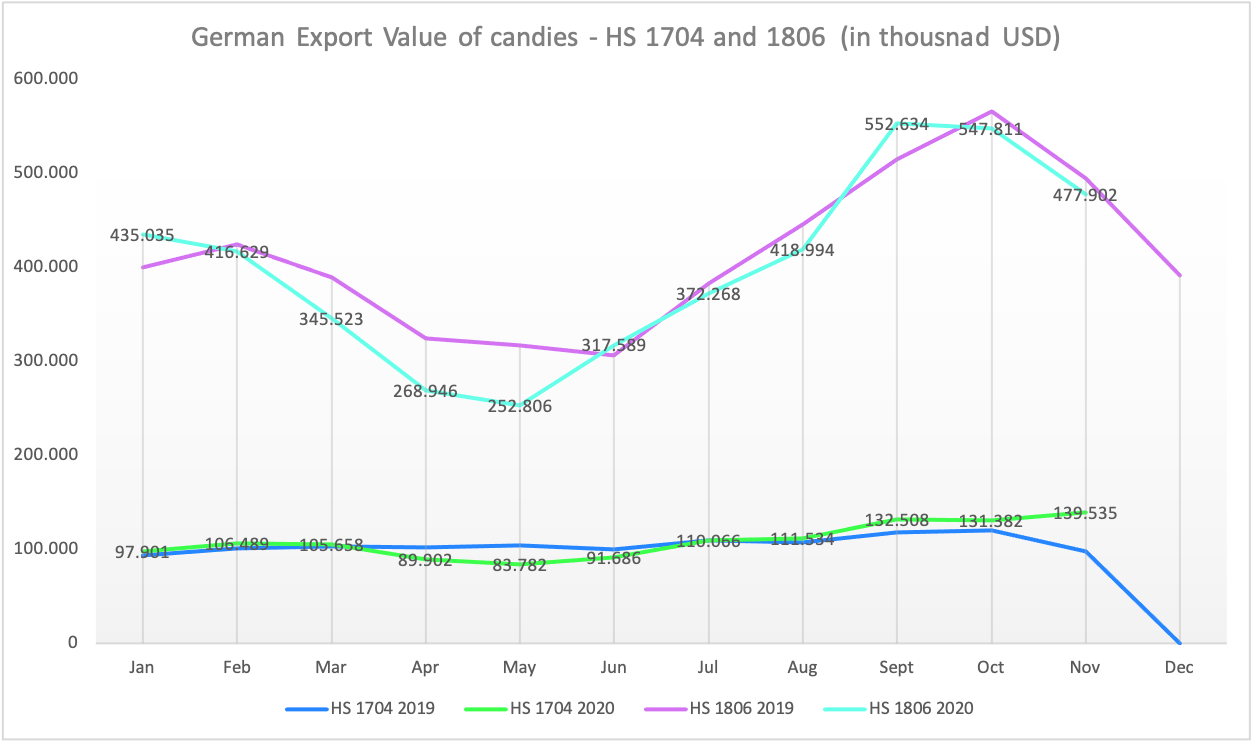Drop in German confectionery exports to the UK due to Brexit
The exports of German confectionery saw a significant reduction in volume starting this year mainly because of the end of the Brexit transition period. From January 1st, new formalities and paperwork are mandatory for exports and imports to and from the UK, this was no different for confectionery products.
The Association of German Confectionery Industry (BDSI) which represents more than 200 members of the German confectioneries trade, reported that 33% of the makers already feel the reduction of exports. More than 50% of the members feel that the paperwork and formalities for the exports are very complicated and a challenge to comply with. A temporary disruption in supply to the UK markets is a real concern for about 15% of the assessed members, and 9% of the members have decided to stop trade altogether due to difficulties in exporting to the UK.
German candy exports revenue in 2020
The UK is one of the biggest destinations for German confectionery, it represents about 10% of total export value for the sector. According to BDSI, the sector is concerned that the added formalities might further aggravate export values of the segment which was already reduced by 3.3% in 2020 in comparison with 2019 achieving USD 10.1 billion (EUR 8.4 billion).
In the comparison of confectionary’s export value of Sugar confectionery, including white chocolate (HS 1704) and chocolate and other food preparations containing cocoa (HS 1806) for January to November of 2019 and 2020, it is verified that the combined total value has decreased by 2.0% totaling USD 5.72 billion and USD 5.61 billion respectively in 2019 and 2020. But analyzing it separately, the export value of Sugar confectionery has increased by 3.7% from January to November of 2020 in comparison to the same period in the previous year totaling USD 1.2 billion, and the chocolate exports have decreased by 3.5% in the same period totaling USD 4.4 billion. The bigger value of exports of chocolates had a more significant impact on the overall sales of the segment.

Source: Tridge, ITC.
Driver shortages
The extra bureaucracy is not the only problem face by the exporters. The new rules on COVID-19 free medical certifications requested by the boarders to enter the UK are further complicating the logistics. Many drivers who were stuck in ports before Christmass for days now refuse to transport the goods to the UK. The imposition of new rules is causing extra costs, delays, and driver shortages. Almost 20% of the BDSI members fear that the stricter entry controls to the country might become an issue beyond the pandemic period, affecting trade between the UK and Germany, and other EU countries.
Companies consider investing outside the UK
The complications on trade-in or out of the UK are causing many companies with production facilities in the UK to invest in facilities and distribution centers elsewhere in the EU to avoid the extra paperwork and possible increase in taxes whenever duty-free conditions are difficult to prove. This will cause a decrease in job opportunities within the UK together with an increase in imported products’ prices as this extra paperwork will also mean more costs.
Sources:
- Association of the German Confectionery Industry. "Sweets industry looks back on a difficult year in 2020 - Coronavirus impending industry's important export business"
- Confectionary News. "Brexit import and exports of confectionery hit as EU and UK firms grapple with new rules".
- Confectionary Production. "Germany highlights a dramatic drop in confectionery exports to UK due to Covid and Brexit".
- Just Food. “German confectionary exporters lambast post Brexit control as shipments suffer".
- ITC. Trade Data.


